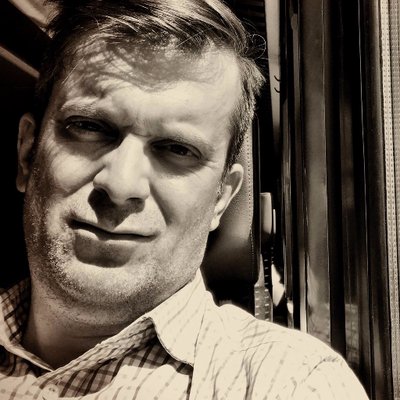One final reflection from Jon Jacob on what the Eurovision Song Contest means to him. The man behind @ThoroughlyGood has been busy in the press room, enjoying his time in the arena, and warns about the all-consuming passion that the Song Contest creates…
I can’t leave Vienna and return to the relative normality of everyday life without completing one final task: writing this. Like blogging in general, I know I enjoy writing but I’ve no real sense of whether anyone reads these things and, if they do, whether they enjoy it (relax Jon, there have been lots of enthralled readers – Ewan) But, when you’ve said you’ll write three pieces about your experience of coming to Eurovision, you have to remain good on your promise.
So, how has my Eurovision been this year?
This is my fourth contest and its twelve years since the first one I attended. Some things are the same as they’ve always been. It’s given me a chance to reconnect with some familiar experiences. That wired feeling that comes from spending too long in a press room has its roots (I now finally come to understand) from a heady mix of caffeine and adrenaline. When either drop off, the come down can be catastrophic (as the manager of the hotel I’m currently staying for the remainder of my trip will surely testify).
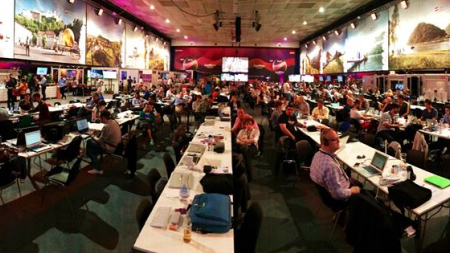
The Vienna Press Room (image: Jon Jacob)
That aside, the experience has also exposed to the variety of emotional responses which accompanies such a high octane experience. Intense happiness, and overwhelming sense of fear, paranoia that the rest of Europe not only hates the UK but hates me in particular, and the overly protective feeling I have towards our two performers – Alex and Bianca. A month or so ago when I met them in the BBC Club at Western House in central London, my heart was pounding. Now as we approach the final I’ve seen them every day this week, said hello and passed on my appreciation repeatedly, all in a vaguely indirect way to keep an eye on them and check they’re bearing up OK.
Quite where this comes from a I don’t know. Both of them are adults and perfectly capable of looking after themselves. I care more for two relative strangers I’ve come to know (sort of) over a month or so, than I do for people I’ve lived next door to for ten years. And that’s just plain weird.
Spoiler Free Is Fun
I was right to avoid the spoilers. Pouring over rehearsal videos and trying to work out some kind of flaky narrative is something I had done before from the comfort of my kitchen at home. It never really turned out to be useful, entertaining or absorbing. More of an exercise that squeezed out some of the joy from the process.
It was wise as well to avoid some of the blogs (ironic considering I’m a blogger myself). I’ve heard of the more vicious write-ups and accidentally ended up one gleeful creation which had me break out in hives. It left me concluding that there are those who weren’t in the lesson where the teacher quite clearly said, “if you can’t say anything nice, then don’t say anything at all.” Inclusivity is a good thing – it’s what has given Eurovision its distinctive feel – but there have been moments this week when I’ve felt that for some writing about Eurovision is a wholly self-aggrandising opportunity.
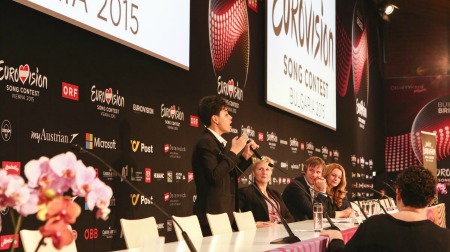
Another press conference musical performance (Photo: Eurovision.tv)
I’m pleased too I hadn’t started listening to the songs too early either. This was both to avoid Eurovision fatigue and to make it easier to make a snap judgement whether or not something had succeeded on-screen or not. There have been moments over the past few days when I’ve looked at the screens and thought, “Why on earth are you doing that?”, “Why the hell are you throwing that to the floor?” and, “Why have you set fire to your piano?” That isn’t a new observation necessarily. But what I’ve wondered about is when the usual tools deployed to measure of artistic credibility are abandoned. At what point is what we see on screen no longer camp, stupid, or ill-judged, but instead becomes the accepted language of Eurovision? Audiences in the UK don’t go through that transition. They’ll tune in on the night and see the oddness and wonder, “how did that arrive on stage?”
An Island In A Sea Of Song
And that brings me on to the old familiar observation I recall from my first visit and, as it happens, the one that resonates the most.
There is a loneliness at Eurovision too. Not in terms of not knowing people or feeling at loose end when there’s nothing to do. There’s never any dead time to fill at Eurovision. Quite the opposite, I’ve been reminded repeatedly this week that one has to be quite ruthless about extricating oneself from the bubble in order to recuperate.
No, the loneliness goes deeper and broader than that, taking in national identity. It’s an observation subject to personal projection (inevitably) and most scarily of all hints at some of the UK’s perception of Europe.
Two British people this week (I shan’t name them) pointed to how they felt different from nearly everyone else at Eurovision. They highlighted us being on the fringes of Europe geographically and how that’s translated in the press room. Those peoples comments resonated because they tapped into how I felt about myself here too. I feel tall and proud when I’m in the UK walking up Regent Street on my way to work. Here, my shoulders are hunched and I feel slightly embarrassed about being British. “Oh,” says a woman at the same table peering at my accreditation badge as she sits down (no one asks one another’s name here – they just stare into the middle of your chest and work it out themselves), “you’re from the UK.” And there the conversation ends.
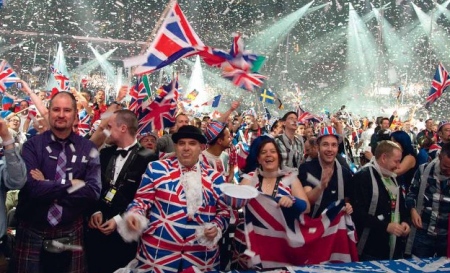
OGAE UK in full flow
Paddy O’Connell during his Radio 2 Eurovision show on Thursday too posed the question about whether UK audiences take Eurovision too seriously, and look at it through the prism of the pop music we understand, one built on our heritage and our national identity. There is some truth in that. We maybe the ones who can’t or won’t let our hair down or, if we do, we feel really uncomfortable doing so. Be amongst the audience during a Eurovision show and the unbridled enthusiasm for the competition is evident to all. We’ve demonstrated that enthusiasm at the 60th Greatest Hits show in Hammersmith a few months back. Maybe the problem is not the audience. Maybe it’s some of those who are writing about it.
We Were Invited, Yes?
When I first came to Eurovision, the UK came last for the first time. I was gutted. It was a tremendous shock. Heartbreaking. The walk back from the venue to my hotel was long and very sad. For years after that I remember feeling that I just wanted Europe to love us again, or to find a way of letting us back in to the party. But slowly I’ve come to wonder whether actually, we’re not really part of the party at all. Maybe we’ve never been. Maybe we’ve attended the party but always stayed in the kitchen and got drunk on our own.
That kind of loneliness is a horrible feeling to experience at an event which evidently inclusive and stimulates an otherwise infectious feeling of warmth. It’s the feeling which grabs hold of you in your darkest moments (usually when you’re wired, or when you’re staring at the press room votes board) and makes you wonder whether everyone is basically laughing at you behind your back.
A Destination Called Home
So, I approach the final and the flight home the day after with two overriding thoughts. The first is that I want is to go home and see the cats and see my husband and return to normal. The second is that I want to leave Vienna not feeling lonely in Europe. I don’t quite know what it will take for me not to feel lonely in Europe, but I’ll know it when I see it.
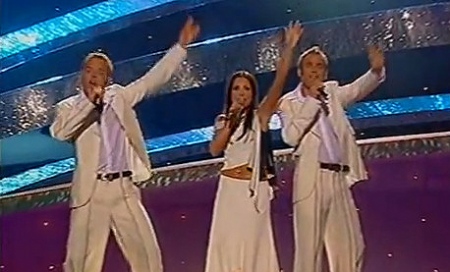
Hello from Mars
I adore Eurovsion and always will, but this year more than any other I’ve acknowledged how incredibly tough it is both physically and emotionally. It is a process that makes all sorts of emotional demands which can, in turn, lead me to have arguments with hoteliers which do neither party any good. It’s the most glorious of television shows but it’s one which needs to be approached very, very carefully.
Eurovision is not for the faint-hearted.
Jon Jacob is keeping a Eurovision diary. Read it at www.thoroughlygood.me/eurovision. You can find Jon on Twitter where he’s @ThoroughlyGood.








